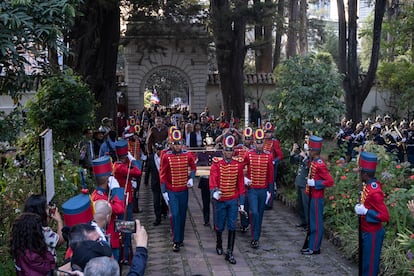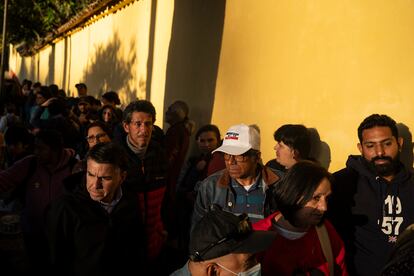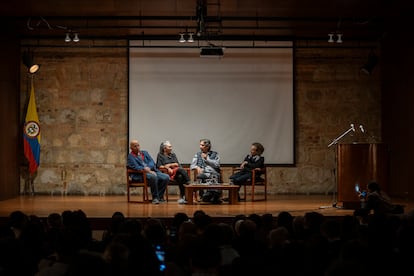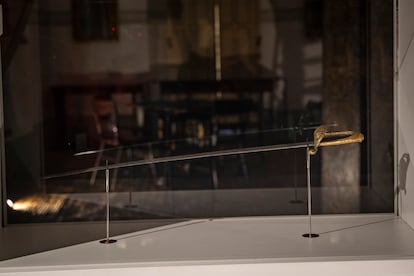50th anniversary of Simón Bolívar’s pilfered sword: “A vindication of peace”
Colombian President Petro was a member of the M-19 guerrilla group that stole the liberator’s weapon, now on exhibit in a Bogotá museum


On the afternoon of January 17, 1974, Álvaro Fayad and a small team of guerillas orchestrated a daring heist. Their target: the sword, stirrups and spurs of Simón Bolívar, the revered liberator of six Latin American countries. These precious artifacts were housed in glass case and safeguarded in the Quinta de Bolívar Museum – a colonial mansion in the heart of Bogotá. With this audacious act, the world bore witness to the birth of the M-19 – the urban guerrilla movement that notably counted President Gustavo Petro among its members for many years. Fifty years have passed since that momentous day. On January 17, 2024, the Colombian government celebrated the event with activities, panel discussions and exhibitions. The commemoration will culminate with the return of the stolen sword to its rightful home in the mansion it was taken from. The sword will be on public exhibit until January 30.
Culture Minister Juan David Correa kicked off the commemoration with a short speech at the National Museum. “The sword stands as an enduring symbol of the M-19, yet its significance transcends any singular act. It serves as a testament to a visionary’s dream of a great republic, forged more than two centuries ago,” he said to the applause of many former M-19 members in the audience. The guerrilla group demobilized in the late 1980s, signed a peace accord with the government and became a key participant in the drafting of Colombia’s 1991 Constitution. “M-19 kept its promise to society. This commemoration is a vindication of peace, not violence,” said Correa.

For Correa, discussing the significance of Bolívar’s sword creates opportunities for reflection and dialogue on how museums contribute to building a culture of peace. “The country needs national unity. This is President Petro’s current stance and echoes the sentiments expressed by M-19 Commander Jaime Bateman many years ago.” In his concluding remarks to the news media, Correa reiterated the purpose of the commemoration: “Join us in a thought-provoking dialogue on peace, where our aim is not to achieve consensus, but to embrace the richness and complexity of our shared story. The sword, beyond its connection to the M-19 50 years ago, embodies the very essence of our republic’s inception.”
After Correa’s speech, there was a panel discussion about how the theft of the sword and its significance. Participants included Senator María José Pizarro (Historic Pact for Colombia coalition), the daughter of the late M-19 leader Carlos Pizarro, who led the guerrilla group to peace. Also present were Vera Grabe, the government’s chief negotiator with the ELN militia and a former M-19 leader, and Otty Patiño, Colombia’s High Commissioner for Peace and Grabe’s former comrade-in-arms. Grabe humorously recounted her unwitting involvement in the sword theft. “I was at the University of the Andes, and after classes, I went down to Quinta de Bolívar to collect intelligence for M-19. But I had no idea we were going to steal the sword until it actually happened,” said the only woman in the M-19 central command. Patiño spoke about the historical significance of the theft. “Taking the sword from the Quinta de Bolívar was a recognition of its significance as a symbol of the Liberator and the ideals he represented. M-19 added a new dimension to Bolívar’s revolutionary Latin American legacy.”
Bolívar’s revolutionary vision of a unified Latin America independent of Spain is evident in writings like his “Letter from Jamaica” in 1815. Petro has laid claim to Bolivar’s ideas on many occasions. One of his first actions after he was sworn in as president on August 7, 2022 was to order the military to bring the weapon – a symbol of revolution – to Bolívar Square in the historic center of Bogotá. Impeccably attired soldiers dutifully executed the order of the former guerrilla leader, and Senator Pizarro formally presented Petro with the sword, marking the inauguration of Colombia’s first left-wing government in decades.

Pizarro told how in 1990, when she was 13 years old, she and other children of former M-19 guerrillas presented the sword to President César Gaviria as a peace gesture from a new generation who wanted an end to the long-running conflict. Pizarro recently tweeted a photo of her own handcrafted, miniature replica of the sword, saying “I made this replica in 2007 for an exhibit about my father, Carlos Pizarro... I have kept it as a symbol of peace, sovereignty, integration, Latin American identity and unity, and national reconciliation.”
Despite the call for peace and harmony, some opposition politicians criticized the commemoration events. Senator Paloma Valencia, from the right-wing Democratic Center party, tweeted her disapproval: “It is highly inappropriate for the government to use its power to commemorate the demands of a terrorist group like M-19. It is shameful that they celebrate the theft of Bolívar’s sword and glorify memories of terrorism like kidnappings, murders of union leaders, and the takeover of the Palace of Justice. These actions are abhorrent and deserve strong condemnation. The use of armed struggle is and will always be unacceptable. We must never glorify violence.” Another opposition senator, María Fernanda Cabal, also condemned the commemoration events: “This show of making the theft of Bolívar’s sword look like a ‘revolutionary act,’ the statements made by [recently released convicted drug trafficker] Carlos Lehder, and the disgraceful smear campaign against General Arias Cabrales are all part of a strategy to rewrite our history.”

The sword with a guard grip featuring a relief map of Gran Colombia will be removed from public display in two weeks. But Simón Bolívar’s dreaming of sheathing his famous weapon once and for all will have to wait until social justice is ultimately achieved in Colombia.
Sign up for our weekly newsletter to get more English-language news coverage from EL PAÍS USA Edition
Tu suscripción se está usando en otro dispositivo
¿Quieres añadir otro usuario a tu suscripción?
Si continúas leyendo en este dispositivo, no se podrá leer en el otro.
FlechaTu suscripción se está usando en otro dispositivo y solo puedes acceder a EL PAÍS desde un dispositivo a la vez.
Si quieres compartir tu cuenta, cambia tu suscripción a la modalidad Premium, así podrás añadir otro usuario. Cada uno accederá con su propia cuenta de email, lo que os permitirá personalizar vuestra experiencia en EL PAÍS.
¿Tienes una suscripción de empresa? Accede aquí para contratar más cuentas.
En el caso de no saber quién está usando tu cuenta, te recomendamos cambiar tu contraseña aquí.
Si decides continuar compartiendo tu cuenta, este mensaje se mostrará en tu dispositivo y en el de la otra persona que está usando tu cuenta de forma indefinida, afectando a tu experiencia de lectura. Puedes consultar aquí los términos y condiciones de la suscripción digital.








































